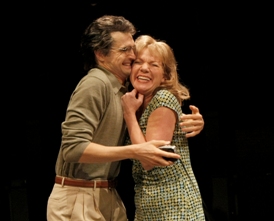Tom Stoppard’s affable humanity, mordant wit, and cultural intelligence rock out in ACT’s “sweet-bitter” production of his 2006 Rock ‘n’ Roll. The term “sweet-bitter,” coined by classical poet Sappho to describe the deliciously unmanageable nature of an irresistible call, is one of the many cerebral party favors Stoppard bestows in the play. It perfectly describes the tone and spirit of this multilayered, microcosmic human portrait of the Cold War.
The play’s 22-year timeline begins in early 1968 under relatively happy circumstances, as giddy Czech grad student Jan bids farewell to his Cambridge mentor Max and Max’s daughter Esme. Jan returns home to find the Prague Spring underway—but the Soviets can’t leave them kids alone, and soon tanks are mowing down dissent in Wenceslas Square. Played by Matthew Floyd Miller, Jan promptly endures an absurd, ominous, yet amusing governmental interrogation for smuggling in “socially negative music” (i.e., rock records), and thus begins a downward spiral for him, and Czechoslovakia, of harassment, authoritarianism, and calcifying cynicism.
Meanwhile, in merry old Cambridge, Max (Denis Arndt) waxes elegiac about Communism’s charms as cancer tears at the body of his classics-professor wife, Eleanor (played with resplendently dowdy passion by Anne Allgood). The couple’s knock-down existential debate about what a person fundamentally is—matter or spirit—hits an almost unbearable emotional rawness. But this being Stoppard, you needn’t fear getting drenched in any sentimentality about terminal illness. After she’s lost breasts and hair to cancer, the philandering Max tells Eleanor he still loves what’s left of her: “Just don’t lose half your bum, that’s all.”
The relatively short scenes feel pleasantly episodic as the action volleys between Prague and Cambridge, even as the political repression deepens. Changing haircuts and placards signal the passing years. A minor irritation is the sheer amount of narrative that characters deliver via “checking-in” updates since the last time they met. Eventually, though, what’s going on in their lives does form a rich picture. This is a generally likeable lot, despite some atrocious interpersonal behavior. Three cheers for emotional ambiguity, complexity, and the overt acknowledgment of unfairness!
Miller uses his delicate features and lithe body to convey effectively the gradual wizening of Jan’s spirit. Arndt makes Max a magnetic, narcissistic tyrant whose privilege and English passport let him stay in love with the ideals of Communism without getting scarred by its actual brutal practices. (At times, Arndt seems disconnected from the professor’s spiels, as if the character doesn’t quite believe in his own propaganda.)
Director Kurt Beattie keeps the pace brisk through the ideological battles, which means you have to pay attention. It’s definitely worth a little preshow Googling about the Prague Spring to get familiar with Alexander Dubcek the reformer, Gustav Husak the hardliner, and Vaclav Havel the freedom fighter.
So where’s the rock ‘n’ roll? Does it stay in Jan’s confiscated luggage? The answer is…it’s everywhere! Jan and Esme trade vinyl, and later cassettes, across the Iron Curtain. (Jessica Martin plays Esme as a young woman, Allgood is Esme as an adult.) Jan and his Czech friend Ferdinand (Peter Crook) fight about rock, dance to it, and use it as a standard to measure their own freedom and a medium in which to incubate their vision of the future.
The eerie (and somewhat spindly) backbone of the play is Syd Barrett, the drug-addled “lost genius” of Pink Floyd who appears to Esme as “the Great God Pan” in the opening scene, then periodically returns like a ghost. Almost 20 years later, grown Esme tries to explain to her daughter, Alice (Martin, in a second role), why Barrett and his music were so vital to her baby-boomer generation. When Barrett played, she says, “Time didn’t leave things behind, but kept them together.”
This age-old nostalgia for prelapsarian wholeness feels exquisitely, sweet-bitterly right by that point in the play’s chronology. It’s 1987, the historical moment when two testy superpowers are close to mutually assured destruction. And yet two years later the Berlin Wall will crack—like those around Jericho, Stoppard argues—from the sounds smuggled inside a suitcase.








